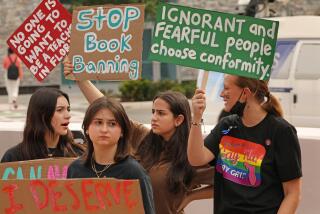Library Told to Return Hasidic Tomes : Religion: Lubavitch rabbis conclude their monthlong Kremlin protest.
- Share via
MOSCOW — One of the oddest protests ever seen in this city ended Friday when a group of bearded, soberly dressed Hasidic rabbis suddenly stopped picketing the Lenin Library, an action they had kept up 24 hours a day for nearly a month.
The reason: They finally sensed victory. A high Russian court has ordered the library to hand over to the Hasidim 12,000 Jewish books confiscated soon after the Russian revolution, a truckload of literature that the ultra-orthodox Lubavitch Jews say is a priceless trove of spiritual wisdom.
“After 70 years, justice is finally being done,” said Rabbi Boruch S. Cunin of Los Angeles, director of Chabad Lubavitch on the West Coast of the United States and an organizer of the protest on the steps of the library across from the Kremlin.
Soviet officials had claimed that to hand over the annotated copies of religious writing would endanger all cultural holdings in the country because a great percentage were expropriated after the proclamation of a Socialist regime.
But according to the Hasidim, the Russian Federation’s Arbitration Court sided with their argument that the books rightfully belong to the original owner’s grandson, Menachem M. Schneerson, the rabbi who is the leader of the New York-based Lubavitch movement.
The rabbis said the books are not worth a lot in themselves but are priceless to them and their spiritual brethren because they also bear the notes and comments in the margins written by five generations of leaders of the Lubavitch movement.
These annotated copies of the Talmud and prayer books and other volumes, chiefly in Yiddish and Hebrew, represent nothing less than the “spiritual core” of the Lubavitchers’ library, in Cunin’s words.
The fate of the books became a contentious issue in Soviet relations with the outside world. Foreign leaders, including President Bush, British Prime Minister John Major and German Chancellor Helmut Kohl, appealed to Soviet President Mikhail S. Gorbachev to see to it that the books were handed over. But until 10 months ago, Cunin said, no one in the Lenin Library even admitted knowing anything about them.
Although Cunin was jubilant over the Russian court’s decision, he said there are still grounds for prudence because the books remain inside the Lenin Library for now.
“If, on the Sabbath, they say we can remove them, we will walk over there--we are allowed to walk 100 miles on the Sabbath, but we can’t take a car for even a block--and we will carry the books back” to the Lubavitchers’ Moscow headquarters, Cunin said by telephone.
Schneerson’s grandfather was the leader of the religious movement during World War I when it was still based in the present-day Soviet Union. As the German army approached his home in the Byelorussian town of Lubavitch, from which the movement derives its name, he sent the 12,000 volumes to Moscow for safekeeping.
A few years later, after the Bolsheviks took power, they confiscated the tomes. They were later moved to the Lenin Library, the country’s largest book repository.
More to Read
Sign up for Essential California
The most important California stories and recommendations in your inbox every morning.
You may occasionally receive promotional content from the Los Angeles Times.













